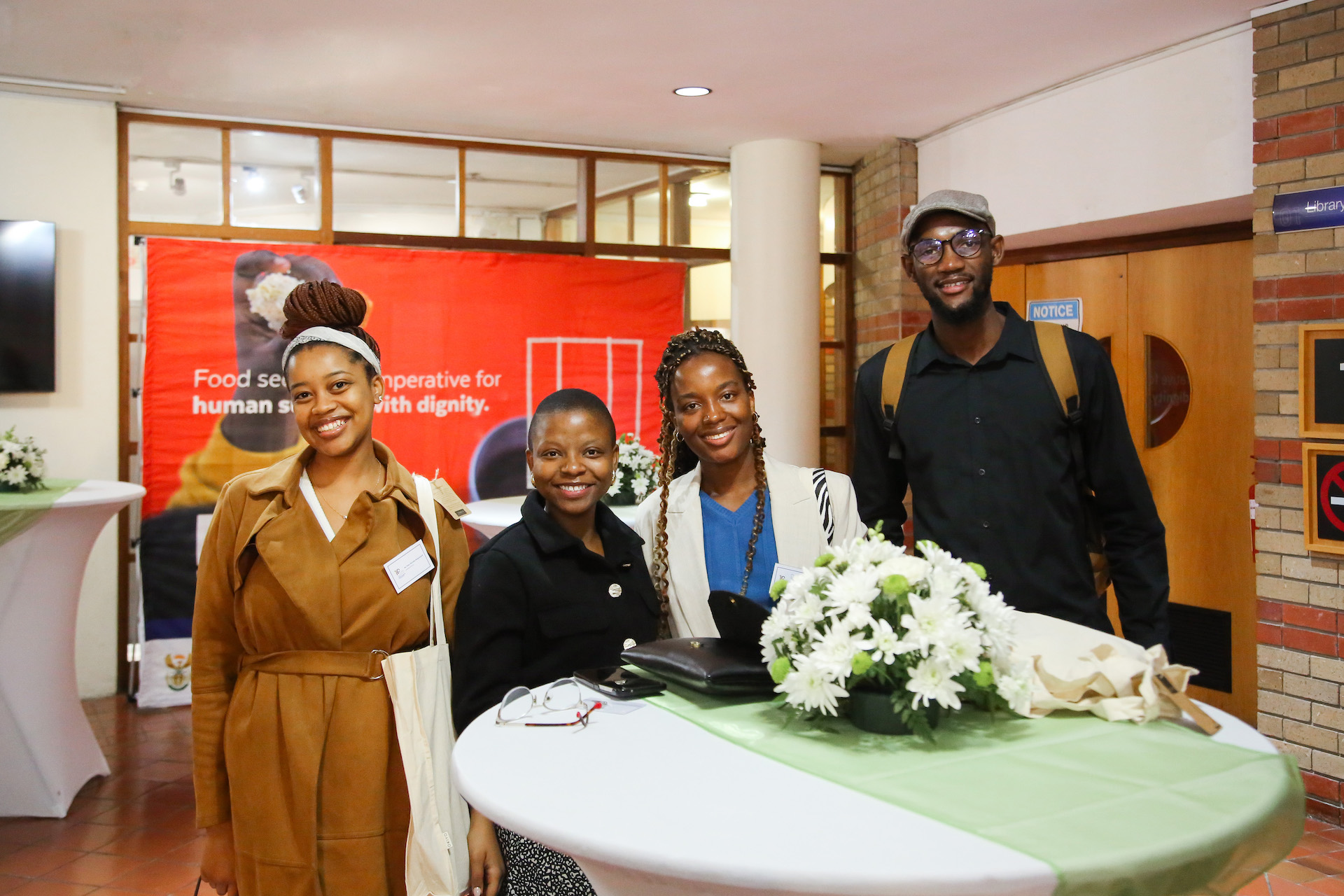
Thato Mokgalagadi, a student currently doing her MSocSci Development Studies degree at CoE-FS co-host institution, the University of Pretoria. Photo: Supplied.
Since its inception in 2014, the DSI-NRF Centre of Excellence in Food Security (CoE-FS) has provided over 700 bursaries to postgraduate students and postdoctoral Fellows, who are all referred to as grantees. The CoE-FS has also supported some 250 students who, while not receiving financial support, are included in CoE-FS projects through supervision and work-study. This speaks to the CoE-FS’s commitment to growing South Africa’s research capacity through training, grants and bursaries.
Thato Mokgalagadi is one of the CoE-FS’s grantees, having joined the Governance, Power and Public Engagement in Food Systems programme, which is led by principal investigator Professor Julian May, and Dr Marc Wegerif, Mokgalagadi’s supervisor, and senior lecturer at the University of Pretoria. Mokgalagadi, who is completing her master’s at UP, answers a few questions about the impact of CoE-FS support on his academic career.
1. How has support from the CoE-FS shaped your academic journey?
CoE-FS support shaped my academic journey by providing access to significant opportunities for the growth of my academic life, such as attending the CoE-FS 10 year anniversary symposium, and networking with renowned experts in the field, including exposure to the field of food and nutrition from the street food traders perspective, to the fresh produce markets perspective. These opportunities enhanced my research skills, broadened my perspectives, and helped me stay updated on the latest developments in food and nutrition security.
2. Can you describe a specific challenge during your studies that our support helped you overcome?
One specific challenge I faced was struggling to pay my university fees. The CoE-FS support helped me in this regard with funding my academic journey. The monthly allowance also helps me take care of myself and I have thus found financial independence. CoE-FS support helped me by providing guidance from an experienced supervisor and access to relevant literature. This support enabled me to develop a robust methodology that yielded valuable insights.
3. In what ways has the supervision or mentorship provided by the CoE-FS influenced your research/you?
The supervision and mentorship I received from CoE-FS influenced my research by helping me refine my research questions, identify knowledge gaps, and develop a critical thinking approach. My supervisor’s expertise and industry connections also facilitated collaborations with stakeholders, enriching my research with practical perspectives.
4. Has our support opened any doors for future academic or professional opportunities? If so, could you elaborate?
CoE-FS support opened doors for future opportunities, such as presenting my research at the CoE-FS 10 year symposium in May (2024), being part of the Wok Package(3) for the Urban Food System done at a national level with leading researchers, and networking with potential employers. These experiences have prepared me for a career in research and policy development.

Thato Mokgalagadi, with fellow grantees at the CoE-FS 10th Anniversary Symposium. From left to right: Mokgalagadi, Tshiamo Setuke, Rejoice Mutema and Oscar Sithole. Dr Marc Wegerif is their supervisor. Photo: Je’nine May/CoE-FS.
5. What role did the CoE-FS play in helping you develop the skills needed for your current or future career?
CoE-FS helped me develop skills like research design, data analysis, and science communication. These skills are crucial for future employment role as a research assistant or perhaps a future career as a policy analyst.
6. How has being involved with our research projects or training shaped your understanding of food and nutrition security in South Africa?
Being involved with CoE-FS research projects deepened my understanding of food and nutrition security in South Africa by exposing me to diverse perspectives, from agricultural economics to nutrition science. This interdisciplinary approach has equipped me to address complex food system challenges.
7. What lasting impacts do you foresee as a result of the support you received from the CoE-FS?
The lasting impacts of CoE-FS support include contributing to evidence-based policy decisions, informing interventions that address food insecurity, and mentoring future generations of researchers.
8. How has your confidence in tackling complex challenges within the food system evolved through the centre’s support?
CoE-FS support boosted my confidence in tackling complex food system challenges by providing a supportive environment, constructive feedback, and opportunities to engage with experts. This confidence has empowered me to pursue innovative solutions and seek to collaborate with stakeholders.
9. Would you recommend this type of support to other students, and if so, what specific aspects do you think are most beneficial?
I highly recommend CoE-FS support to other students, as it will create the opportunity to meet with experts in the field of research as well as the potential of research collaborations. These aspects have been instrumental in my growth as a researcher.
10. What impact do you think the CoE-FS has had on food and nutrition security in South Africa?
CoE-FS has significantly impacted food and nutrition security in South Africa by generating high-quality research, informing policy decisions, and building capacity among researchers and stakeholders. The centre’s work has contributed to a better understanding of food systems and innovative solutions to address food insecurity. Broadening their research by including students from various parts of South Africa to do research on food systems has expanded knowledge on food systems in particular parts of South Africa.
related Articles
PhD funding opportunity: Land governance and responsible value chain management in the...
Photo Tim Mossholder/Pexels. Please liaise with your institution’s research/postgraduate office about the institution’s internal closing date. The onus is on…
Dr Mondli Masanabo’s path of passion, perseverance, and purpose
Dr Mondli Masanabo graduated with a PhD in Food Science from CoE-FS co-host, the University of Pretoria. Photo EYEscape/CoE-FS. When…
APPLY NOW: MSc scholarships at UKUDLA centre of excellence
The deadline for applications is 17 February 2025. Photo Liza Summer/Pexels. The University of the Western Cape (UWC) is delighted…



